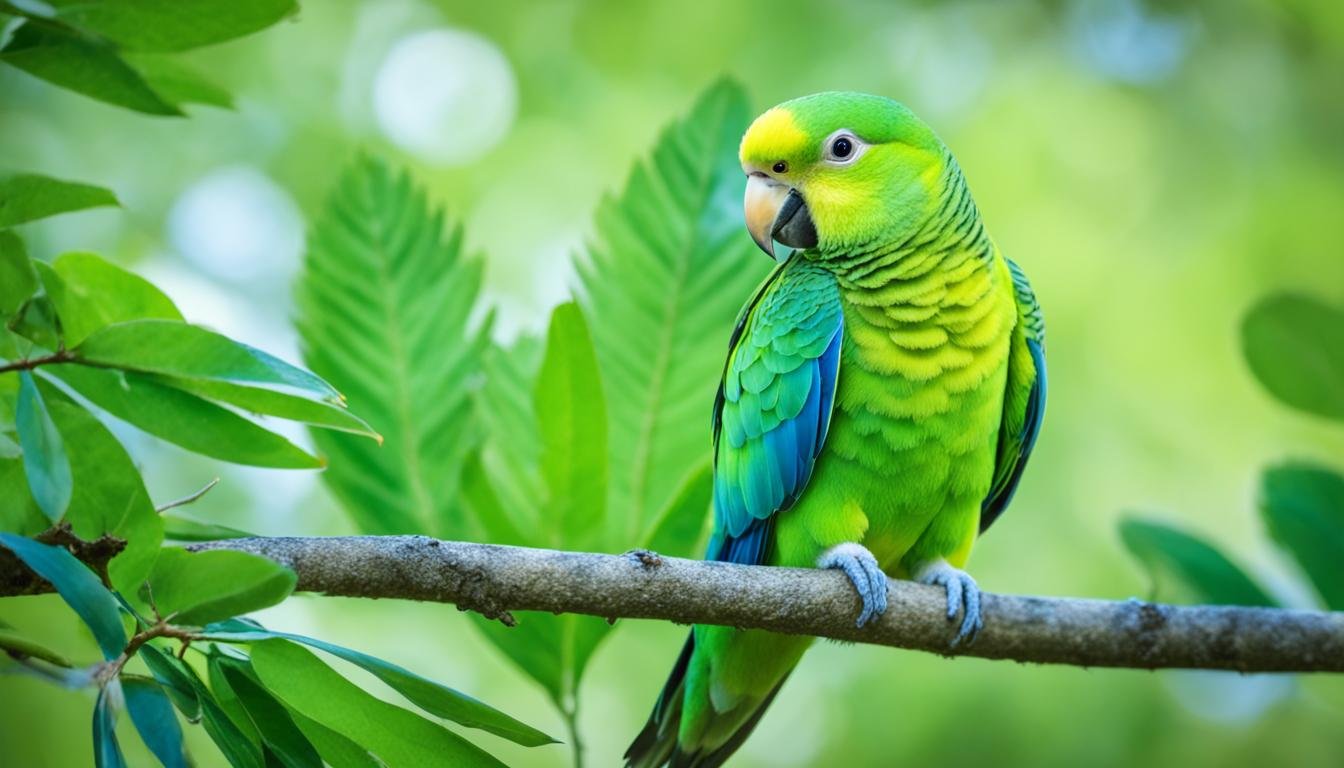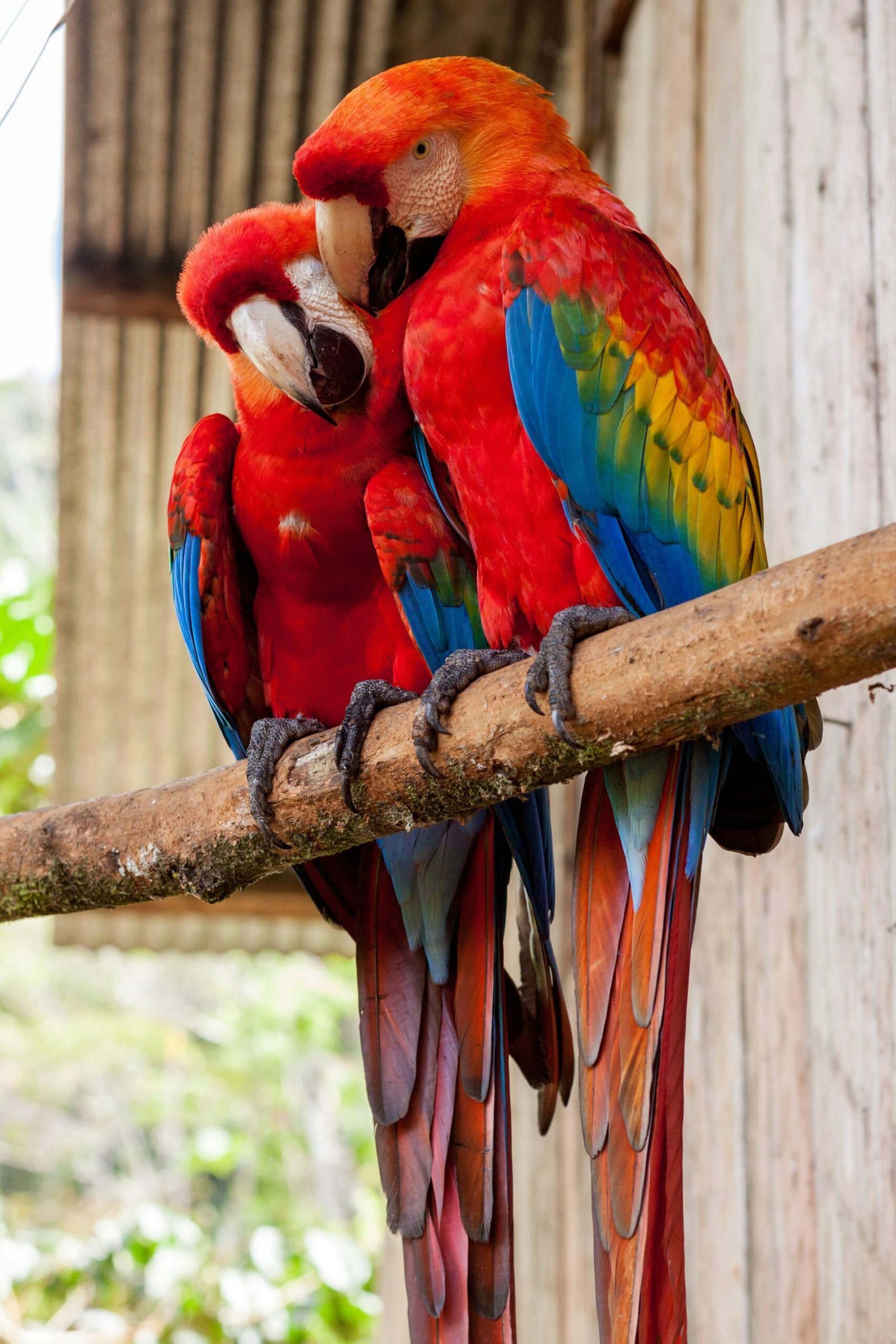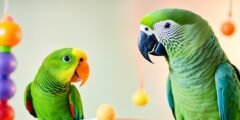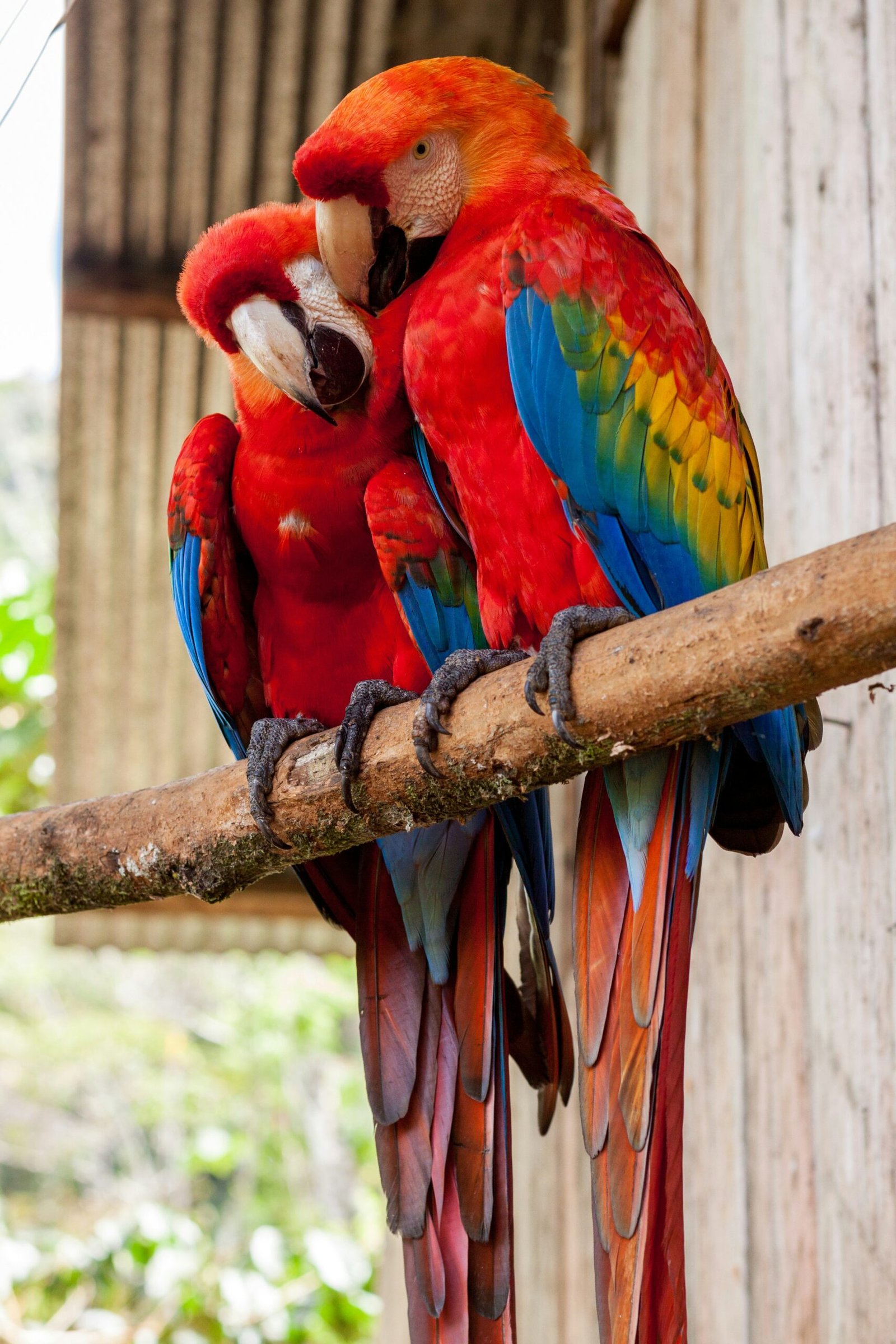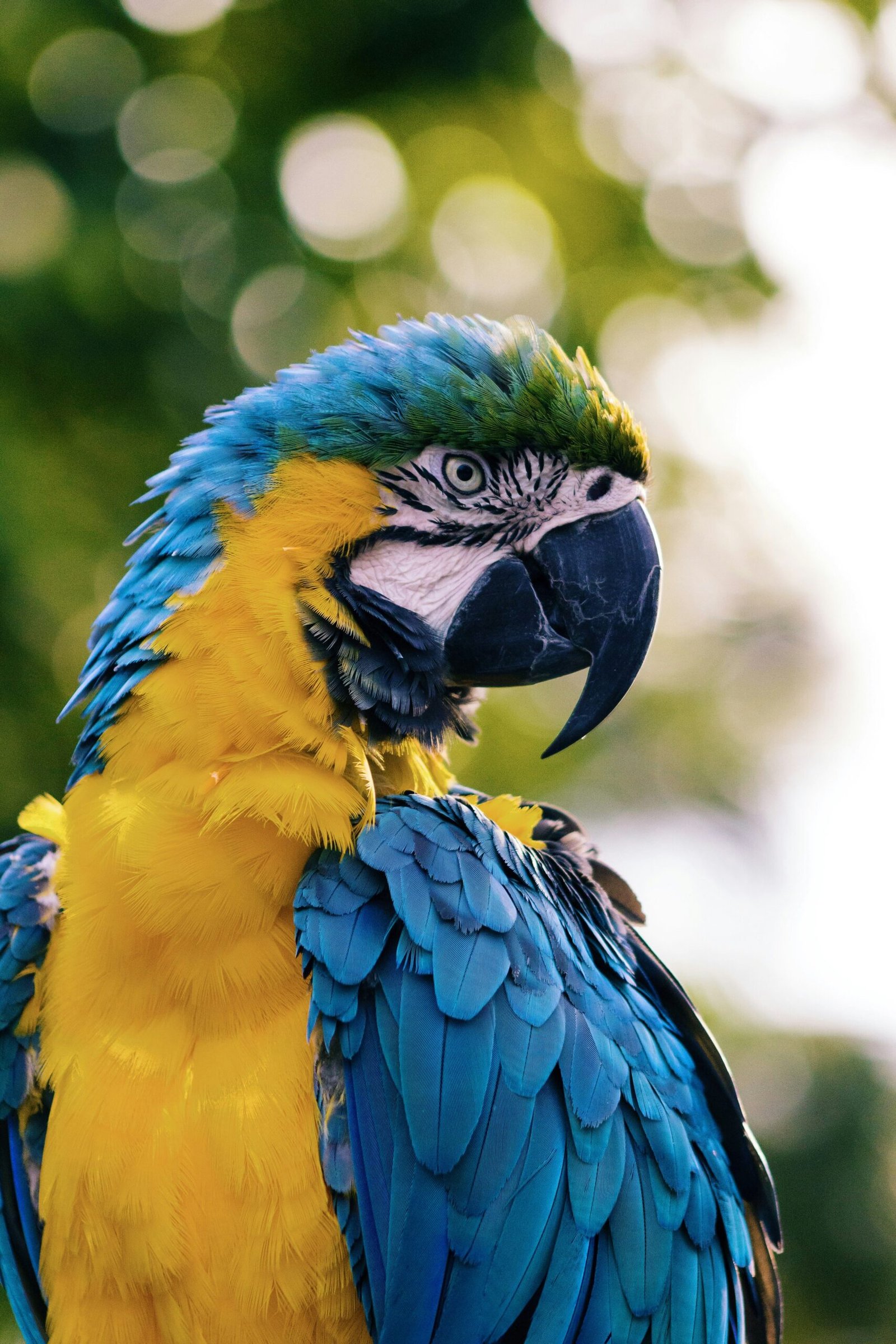Bonding with an aggressive Quaker parrot takes patience and understanding. Use gentle techniques and create a calm space to build trust. This will help you form a strong bond with your parrot. Here are some tips and tricks to help you.
Keep your Voice Low and Inviting
When you want to bond with your aggressive Quaker parrot, it’s key to speak softly. Parrots are sensitive and like a calm space. Soft speech makes a comfy atmosphere that helps your bird relax and trust you.
Loud noises can scare Quaker parrots, making them wary of people. To keep your bird safe, talk calmly. This gentle way makes your bird feel safe and builds a strong connection.
“A calm and inviting voice allows your Quaker parrot to feel more secure in your presence.”
Talk to your bird using its name or sweet terms. This makes your bird feel close to you and builds trust.
“By speaking to your parrot directly, you create a bond built on trust and understanding.”
Being consistent is important. Always speak softly when you talk to your Quaker parrot. This makes your bird happy in the calm space you’ve made.
Think about how a scared bird might hide in its cage. But, a calm space with soft voices makes your Quaker parrot want to be social.
Speak to it
Talking to your Quaker parrot helps you connect and build trust. Soft words and a gentle voice make a strong bond with your bird.
Take it Slow
When dealing with an aggressive Quaker parrot, move carefully and slowly. Sudden moves can scare the bird, making it feel threatened or irritated. To make the bird feel safe, move slowly and calmly.
By moving slowly, you let the Quaker parrot watch and think about the situation. Start by standing far away, where the bird feels safe. Then, slowly move closer, letting the bird get used to your presence.
Remember, building trust is slow. Be patient. Don’t make sudden moves that might scare the parrot. Use gentle gestures and slow movements to show you’re friendly. This helps the bird feel safe and trust you more.
It’s also key to make the space calm for the parrot. Loud sounds and a messy area can make it more anxious. Find a quiet spot to be with the bird. Clean up the area and make sure there’s a comfy spot for both you and the bird.
Feeling threatened can make Quaker parrots aggressive. By moving slowly, staying calm, and creating a peaceful space, you can ease the bird’s anxiety. This makes a safe place for bonding.
Offer Their Favorite Treat
Offering your aggressive Quaker parrot its favorite treat can be a great way to connect. Birds love tasty foods, and giving them these treats can help you bond. But, make sure your bird eats a healthy, balanced diet too.
- Fruit and vegetables: Add fresh fruits and veggies to your parrot’s meals. These foods are full of vitamins and minerals. They help keep your bird healthy.
- Kaytee Superfood Treat Sticks: Try adding Kaytee Superfood Treat Sticks to your bird’s diet. These sticks are made with ingredients birds love. They’re a tasty, healthy treat that’s good for your bird.
Using treats to reward your Quaker parrot can make it more friendly. It makes spending time together fun. But, don’t give too many treats to avoid weight gain and health problems.
“Giving your Quaker parrot its favorite treat is a fantastic way to establish trust and build a bond. But remember, a healthy diet is a priority to ensure their overall well-being.”
Offer Them Comfort
Take your aggressive Quaker parrot out of its cage to strengthen your bond. Birds, like humans, need to explore and interact outside their homes. Giving your parrot time outside is key for their happiness and well-being.
Make a safe space for your parrot to move around and explore. This room should have toys, perches, and objects that keep your bird’s mind and body busy. It lets them act naturally.
“The connection you build with your bird during these out-of-habitat moments is precious. It’s a time for bonding and socializing, where words might not be necessary but the connection is felt deeply.” – Bird Lover Magazine
Be patient when you’re with your parrot outside its cage. Let them come to you when they’re ready. Speak softly and move gently to comfort them. Avoid sudden or loud actions that might scare them.
Regularly giving your parrot these safe times outside its cage will make your bond stronger. It’s when trust grows, and your parrot learns to depend on you for comfort and safety.
Providing an enriching environment for your parrot helps create a comfortable space outside its cage.
Socialize with Your Bird
Spend time with your feathered friend to build a strong bond. Quaker parrots are smart animals that remember good and bad experiences. If your parrot had bad experiences before, they might be nervous around you.
Start by sitting near their habitat and talking softly. This lets them get used to your voice. Spending regular time with your bird helps build trust and security.
As you get closer, spend more time together. Offer treats while you sit by their habitat. This makes them feel good and more likely to be with you.
Be patient with your bird as they adjust. Each parrot is different and will socialize at their own pace. Some may quickly get used to you, while others need more time. Respect their boundaries and let the relationship grow naturally.
When your parrot feels safe, try hanging out with them outside their habitat. Always watch them to keep them safe and let you both bond.
Socializing with your Quaker parrot strengthens your bond and helps their mental and emotional health. Trust built from positive times makes your relationship better, leading to a happier life together.
Play with Your Bird
Playing with your aggressive Quaker parrot can be a fun way to bond. Adding enriching activities to their daily routine helps their physical and mental health. It also makes playtime enjoyable for both of you.
Give your bird a variety of toys to keep them busy. Choose toys that make them think and explore. Puzzle toys and toys with sounds and textures are great for keeping them entertained.
Music and dance can also make playtime fun. Birds love music, so soft tunes can create a calm setting. Try singing or whistling along to let your bird join in.
Carrying your bird on your shoulder is another great idea. It helps build trust and strengthens your bond. Make sure it’s safe by removing dangers and making your bird feel at ease.
Quality playtime is key for your bird’s happiness. It lets them move, explore, and act naturally in a safe way. It also helps you connect more with your bird, based on trust and safety.
Be Patient
Bonding with an aggressive Quaker parrot takes time and understanding. Let your bird adjust to its new home at its own speed. It might feel scared or overwhelmed, showing aggression. By being patient, you help build trust and understanding.
Your bird may adjust at its own pace, which might be slower than you expect. It’s important to respect this. Don’t rush things or push your bird to interact too soon. Create a calm space where your parrot can explore and connect when it feels ready.
Understanding how birds act and read their body language is key. Watch for signs of stress like loud noises, feather plucking, or standing tall. This helps you know how to support your bird better.
Patience is key when bonding with an aggressive Quaker parrot. It’s a gradual process that requires time and understanding. By adjusting to the bird’s pace and giving it the space it needs, you can establish a foundation of trust.
Every bird is different, so some may need more time and patience. Don’t compare your parrot to others. Embrace the unique journey you’re on together.
While adjusting, focus on making positive moments. Reward your parrot with treats when it acts calm and friendly. This encourages good behavior and makes it feel safer at home.
Remember, patience is crucial for bonding with an aggressive Quaker parrot. Spend the time and effort to understand and respect your bird’s needs. With patience, you can build a loving and trusting relationship.
Offer Consistency and Routine
Consistency and routine are key to bonding with an aggressive Quaker parrot. A stable environment and a regular schedule of daily activities help build a strong connection with your bird.
Birds, like Quaker parrots, love predictability and routine. A predictable routine makes them feel secure and comfortable. This helps reduce their stress and anxiety, making them feel safe.
Start by making a stable and comfy home for your Quaker parrot. Place their cage in a quiet spot in your home, away from stressors. A peaceful space makes them feel secure and ready to bond with you.
Make a daily routine for your parrot. Feed them at the same times, play with them, give them toys and puzzles, and let them exercise outside their cage.
Following a regular schedule and offering different daily activities creates a stable and interesting environment. This is key for their well-being and helps them bond with you.
Consistency and routine are good for both your parrot and your relationship with them. When they know what to expect, they feel more secure. This makes bonding easier.
Using consistency and routine can help you connect deeply with your aggressive Quaker parrot. A stable home and regular daily activities lead to a stronger bond and a happier pet.
Seek Professional Help if Needed
If you’re struggling to bond with your aggressive Quaker parrot, it might be time to get help. An avian behaviorist or bird expert can give you the advice you need. They can help you deal with this tough situation.
Even with your best efforts, your parrot’s aggression might be due to deeper issues. A professional can look into this and suggest ways to improve your bond.
By talking to an avian behaviorist or bird expert, you’ll get access to special knowledge. This knowledge is made to help with aggressive parrot behavior. Their advice can really change how you approach things, leading to better results and a happier relationship with your pet.
Remember, asking for help isn’t a failure. It’s a smart move to find the right solutions for your parrot’s aggression. An expert can give you the confidence and support you need to get through this tough time.
When looking for professional help, ask around for recommendations or do some research. Find professionals with a solid background in avian behavior and good reviews from clients.
An avian behaviorist or bird expert can share insights that are hard to find on your own. Their experience and deep knowledge of birds can help you learn how to bond with your aggressive Quaker parrot.
Your parrot’s happiness is key. With the right advice and help, you can beat the challenges and build a strong, loving bond with your feathered friend.
Create a Loving and Nurturing Environment
Creating a loving and nurturing environment is crucial for bonding with an aggressive Quaker parrot. A safe space filled with love and positive reinforcement helps build trust. This strong bond with your feathered friend is essential.
Start by being kind and gentle. Speak to your parrot in a calm tone. Let them know they are safe and welcome. This makes them feel secure and loved.
Positive reinforcement is key for trust. Reward your parrot with treats for good behavior. This encourages them and makes them associate you and the environment positively.
Comfort is important too. Give them cozy perches, soft bedding, and toys that keep their mind busy. This makes them feel secure and at home.
Consistency is also vital. Birds like a structured life. Showing them you’re reliable helps them trust you.
Follow these tips to build a strong bond with your Quaker parrot. Enjoy nurturing your feathered friend and seeing your relationship grow.
Key Points:
- Use positive reinforcement and a calm tone of voice to build trust.
- Offer comfort with cozy perches, bedding, and toys.
- Be consistent and establish routines to create a sense of security.
FAQ
How do I bond with an aggressive Quaker parrot?
Bonding with an aggressive Quaker parrot takes patience and understanding. Use gentle techniques and create a calm space. This helps build trust and a strong bond.
How can I overcome aggression in Quaker parrots?
To beat aggression in Quaker parrots, start slow and offer their favorite treats. Provide comfort outside their home, socialize, and play together. Being consistent, patient, and nurturing is key.
How can I create a calm environment for my Quaker parrot?
For a calm space, speak softly and move calmly. Offer comfort outside its home and stick to a daily routine. This helps your Quaker parrot feel secure.
What can I do to socialize with my Quaker parrot?
Socializing means spending time near its home, talking, and slowly increasing your presence. Building trust is important for socializing with your bird.
How can I engage in playtime activities with my Quaker parrot?
Playtime includes toys in its home, music, and carrying it on your shoulder. This makes for a fun environment and strengthens your bond.
How long does it take to bond with an aggressive Quaker parrot?
Bonding takes time and patience. Each bird is different, so time varies. Let the bird adjust at its pace and be patient with its changes.
What should I do if I’m struggling to bond with my aggressive Quaker parrot?
If bonding is hard, get help from an avian behaviorist or bird expert. They can offer advice and guidance for your bird’s needs.
How can I create a nurturing environment for my Quaker parrot?
Use positive reinforcement and be kind in your interactions. Speak calmly and give a safe space for your Quaker parrot to feel secure and loved.
What are the key factors in bonding with an aggressive Quaker parrot?
Trust, patience, and positive interactions are key. By using the tips and techniques mentioned, and creating a nurturing environment, you can overcome aggression and bond with your feathered friend.
Conclusion
Bonding with an aggressive Quaker parrot can be tough but rewarding. By understanding why they act out and using the tips here, you can build trust and patience. Always speak softly, move slowly, and give them treats to make things positive.
It’s important to create a safe space for bonding. Show them comfort, play with them, and be patient. Stick to a routine to make them feel secure. But, if they keep being aggressive, get help from a pro.
Every Quaker parrot is different, so adjust these methods to fit them. With time and love, you can create a strong bond. Remember, trust and patience are key to connecting deeply with your parrot.
